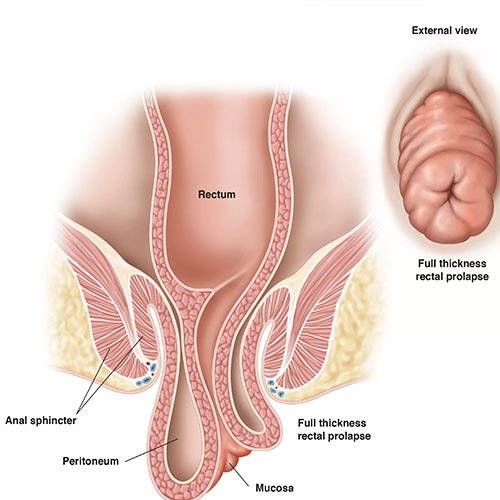
Rectal Prolapse
Rectal Prolapse
Rectal prolapse is a condition where the rectum (the last portion of the large intestine) slips or falls through the anus, leading to protrusion outside the body. This condition can be partial, involving only the mucosal layer, or complete, where the entire thickness of the rectal wall extends out of the anus. While rectal prolapse is not life-threatening, it can significantly affect the quality of life due to discomfort, embarrassment, and other associated symptoms.
While rectal prolapse can be uncomfortable, it is generally manageable with appropriate treatment. Most surgical procedures have a high success rate, although recurrence is possible, particularly in elderly patients. Addressing underlying causes like constipation and strengthening the pelvic floor can also help improve outcomes.

Causes of Rectal Prolapse
Rectal prolapse is typically associated with weakened pelvic floor muscles and supporting structures. Several factors may contribute to this weakening:
- Chronic Constipation and Straining: Frequent straining due to constipation can put pressure on the pelvic muscles, leading to weakening over time.
- Aging: As people age, connective tissues and muscles naturally lose strength and elasticity, making older adults more prone to prolapse.
- Childbirth: Vaginal deliveries can weaken the pelvic muscles and increase the likelihood of rectal prolapse in women.
- Previous Surgeries: Some abdominal surgeries may alter the pelvic structures, leading to prolapse.
- Neurological Conditions: Diseases that affect nerve control of the pelvic floor muscles, such as spinal cord injuries, multiple sclerosis, or chronic nerve damage, can increase the risk.
Symptoms of Rectal Prolapse
Symptoms of rectal prolapse vary depending on its severity but often include:
- Visible Protrusion: A bulge or lump may be noticeable coming out of the anus, especially after a bowel movement or while straining.
- Discomfort and Pain: A sensation of pressure or discomfort, and occasionally pain, may be felt in the rectal area.
- Difficulty Controlling Bowel Movements: Some people experience fecal incontinence or leakage.
- Bleeding and Mucus Discharge: The exposed rectal tissue can become irritated, leading to bleeding and mucus discharge.
- Sensation of Incomplete Evacuation: A feeling that the bowel has not been fully emptied even after a bowel movement is common.
